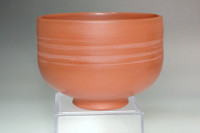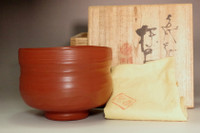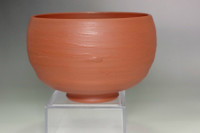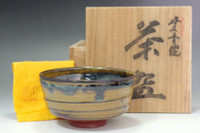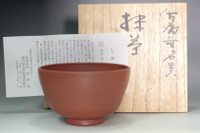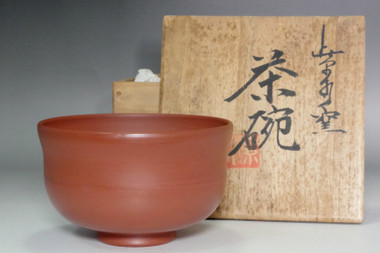 Loading... Please wait...
Loading... Please wait...Currency Displayed in
- Home
- SOLD ITEMS
- Vintage Mumyoi pottery teabowl by Nagao Shisui #4927
Categories
Vintage Mumyoi pottery teabowl by Nagao Shisui #4927 for sale
Product Description
Up for sale is this "Vintage Mumyoi pottery teabowl by Nagao Shisui #4927" If you have any questions please contact us before buy it. No reserve.
- width: approx. 12.6cm (4 61⁄64in)
- height: approx. 7.4cm (2 29⁄32in)
- weight: 264g (w/ box 486g)
This tea bowl is a fine piece of craftsmanship from Sado Island, a place rich in nature in the Sea of Japan. Its reddish hue comes from the clay of the once prosperous Sado Gold Mine, which supported Japan's economy during the Edo period by producing significant amounts of gold. Every time you hold this tea bowl, you will sense its profound history.
Because it is made with rare clay, this tea bowl holds value beyond that of mere tableware. It serves its purpose admirably both as a piece of fine art and as an everyday utensil. Fired from the clay created by the lush nature of Sado, this tea bowl is a special existence that allows you to feel the rich nature and history of Japan up close.
Nagao Shisui
Originally from the former Aikawa Town on Sado Island, Niigata Prefecture, completed his junior high education before apprenticing with the third and fourth generations of the esteemed Jozan pottery lineage in Sado. Seeking advanced skills, he later entered Niigata Toen, under the tutelage of Living National Treasure Sasaki Shodo (1882-1961). There, Nagao received prolonged guidance from both Sasaki Shodo and Miyanohara Ken (1898-1977), honing his craft over many years. Renowned for his unique ceramic creations, Nagao Shisui’s work reflects the amalgamation of traditional and modern techniques, a testament to the rich legacy of his mentors.
Mumyoi pottery
Mumyoi is a type of red soil which contains a rich amount of iron oxide which is produced from around the Gold Mine, and the Mumyoi pottery uses it as its pottery clay, which is then baked at high temperatures.
The character of the clay is such that it requires special work such as polishing while raw and then polishing it with sand after baking it.
In addition, the pottery clay goes through “elutriation” – a way to get rid of sand and impurities in the process of balancing the clay particles – using a 200-mesh sieve which makes the baked pottery clay shrink by around 30% due to the loss of these particles.
Therefore the product is extremely hard and when hit it makes a clear metallic sound and the more use it gets the more it shines.
The Mumyoi Ware products are gaining attention as a means of improving the taste of tea, alcohol, beer and coffee.
In China, Mumyoi had been used as a type of herbal medicine to cure hemostasis since ancient times, but as they did not know the source of the effect they seemingly named it Mumyoi (no name). In Japan this was gathered only around the Sado Gold Mine. It was a byproduct of mining operations during the 1640s – the height of the gold rush on Sado Island after the discovery of the Aikawa mines.
The history of Mumyoi ware began with Ito Jinpei creating Raku Ware using the Mumyoi produced from the Sado Mines in the 2nd year of Bunsei (1819).
Afterward, Miura Jozan (1836-1903) realized that Mumyoi produced from the Sado Mines has a very similar nature to Yixing clay. He doubled his efforts to change the usual Mumyoi ware, which was quite fragile, into strong pottery similar to the pottery created from the Yixing kiln in China, and he completed a piece of strong, high-temperature Mumyoi pottery. Tea tools in Mumyoi ware became popular among people who like green tea because they made tea delicious like Chinese Yixing ware.
According to a record, the famous shogunate retainer, Katsu Kaishu bought tea tools from Miura Jozan.
In 2003 Mumyoi Ware was registered as a National Important Intangible Cultural Property.
The Agency for Cultural Affairs is attempting to register Sado Aikawa gold mines in the World Heritage List now. Unfortunately, because of this, it became very difficult for potters to obtain Mumyoi from around Sado Aikawa gold mines because collecting the mine soil from the area was banned.
shop policy
AppraisalWe are a very small team with limited resources and are unable to conduct scientific age verification or appraisals by the artist’s descendants. We evaluate items using specialized reference books, scholarly resources, and knowledge inherited from senior experts in the field. If a purchased item does not meet your expectations, please feel free to contact us. We sincerely value your opinion.
Cancellation and Return
We accept return only if you contact us within 30 days after you receive the items. Return-shipping costs are the buyer’s responsibility. If you ask a cancellation before shipping the package, we may ask a 20% restocking fee.
Shipping
+ Shipping to the USA, Europe, and Asia is free. For other areas, please contact us. Shipping is via EMS or DHL.
+ VAT is not included in the item price.
+ We will ship within 3 business days. Shipping time is usually around a week.
Insurance
We are not responsible for delays, returns, damage or loss due to customs or postal processing. EMS is insured (the amount on the label is the guaranteed amount). If you choose DHL, we recommend that you purchase additional insurance. Please note that if you choose the DHL drop service option, insurance will not be applied.
Taxes
Import duties, taxes and fees are not included in the item price. If your country requires customs duties, etc., it is your responsibility to pay them.
To customers buying tableware
Our products are mostly used. We sell them in the same condition they were purchased, please be sure to clean them thoroughly before actually using them.

